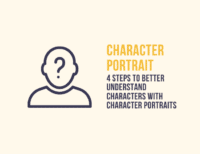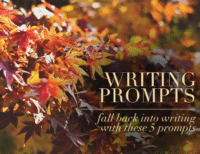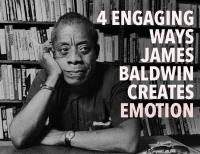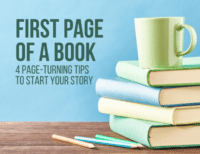Currently I’m reading a collection of essays by the National Book Award winner and genius grant recipient Ta-Nehisi Coates. Many people view Coates, a writer for The Atlantic, as political, but I’ve heard him speak, and he repeatedly emphasizes that he is a writer above all else. He is an observer and he shares his observations with the world, and we can draw valuable writing tips from his work.

3 Writing Tips Culled From the Reflections of a Genius
Coates's book We Were Eight Years in Power consists of articles he wrote during the Obama years, each of which are preceded by Coates’s retrospective reflections on those essays.
As a fellow writer, I was enthralled by those reflections. Here was an anointed “genius” expressing his doubts and self-critiques. There’s something fascinating about watching a successful writer still cringe at the very works that gave him that success.
Given all that, I had to share some of my takeaways, writing tips drawn from Coates’s self-reflections. Here they are:
1. Blog
Before anyone knew who Coates was, he blogged. And he did so solely because he had many ideas and no where to put them. He posted four or five times a day, and over time people (besides his Dad) started reading it. They offered comments and suggested other books and philosophers for him to check out. Eventually the blog drew the attention of The Atlantic.
Writers write. But they also allow others to read and critique what they have written—because it’s the only way to get better. That’s where blogs (or even the comments of The Write Practice articles) come in.
Coates used his blog to get out ideas out of his head and heart, and was open to the comments of others. Many of these posts even served as the starting points for articles he later published in The Atlantic and elsewhere.
Try blogging (or commenting) to test out new techniques, attempt to write in new genres, or to simply workshop certain pieces or ideas. Who knows? You may get the attention of a prominent magazine. 😉
2. Reflect on past work
It was really, really, really interesting for me to see Coates look at an essay he wrote three years ago, think about where he was in his life, and then consider whether he successfully executed his idea or not.
For example, Coates describes a 2004 article he wrote about Bill Cosby as an “attempt”: “I felt myself trying to write a feeling, something dreamlike and intangible that lived in my head, and in my head is where at least half of it remained.” He also admits that he heard about the accusations against the comedian, but chose not to go there. He says that decision made the article less true.
Nine times out of ten when I publish something, I’m done with it forever. I rarely return to past work. But maybe I should. In preparing Eight Years, Coates was able to both reflect upon his weakness in a dispassionate way and appreciate his growth.
As writers, we constantly question ourselves and think our work could be better. But perhaps this self-critique would be more useful to us if we allowed some time to pass first.
3. Seize your moment
Coates says he’s know as a “black writer.” Yes, he’s black, but he also writes about black American issues, specifically. So the election of Barack Obama was directly life changing for him. In other words, it was his moment. Coates writes:
“The fact of Barack Obama, of Michelle Obama, changed our lives. Their very existence opened a market. It is important to say this, to say it in this ugly, inelegant way. It is important to remember the inconsequence of one’s talent and hard work and the incredible and unmatched sway of luck and fate.”
If you find that, after years of setbacks and failure, the world is suddenly ready to hear your voice—speak. Write.
More importantly, pay attention so that you don’t miss the opportunity. As Coates “inelegantly” points out—timing can be just as important as talent and hard work.
What is your unique market? What hole do you fill with your writing?
Your Ideas Can Change the World
Writing is our opportunity to share our observations with the world. Want to influence others with your stories and ideas? Share your work boldly and invite response and critique. Reflect on past work after a few months or years have passed so you can view it through the lens of your personal growth.
Then, when your moment of recognition comes, you'll be ready to seize it.
And your words will change the world.
Have you read Coates's writing or heard him speak? What other writing tips can you draw from his work? Let us know in the comments.
PRACTICE
Today, it's time to share our own perspectives on the world, as Coates does in his books and articles. Is there something you've noticed about the world around you that you've been thinking about? Take fifteen minutes to describe a crazy idea that’s been swirling around in your head.
Then, practice the first tip and share it in the comments section below! Be sure to leave feedback for three other writers, too!







Thank you so much for this Monica.
In the last week of my 3 month stay in the International Writers’ Program in Iowa City, your article is a call to me to be more committed to daily communication. You are right, if I’m not connecting regularly, how do I know how I’m being read?
I’ve been guilty too of not being alert to my opportunities. I wrote a 100,000 word novel about Vietnam from the viewpoint of a South Vietnamese man. I was here, in a UNICEF city of writing when the PBS documentary on Vietnam was shown and blog posts by uncounted South Vietnamese expressed dissatisfaction about how they were represented. I walked into the city’s independent bookstore, saw my book on sale, spoke to the owner BUT somehow forgot to ask her if I could have a reading!!!!!! ;(
I can’t believe this.
Next time.
Meanwhiile, thank you once again for the wake up call xoxo
Thank you Monica for sharing this article. It struck a chord, and prompted me to write the following.
—
A white privileged dude like me can become an ally, and so can you.
Last night, I overheard a Skype conversation between my wife and one of her church friends, a white young man from Utah. They spoke, among other things, about transgender folks and the LGBTQ+ community. Now, my wife holds progressive views relative to her church, and told her friend she believed the church’s stance on gay marriage would change in the future. Her friend disagreed. They had a friendly debate, but his arguments went from logical to anecdotal pretty fast. His stance was that transgender folk make him uncomfortable, thus it must be unnatural. What struck me was his inability to imagine what it could be like to be attracted to someone of the same sex, or feeling so out of place in your own skin that a sex change is a solution to consider.
I was struck by his lack of empathy. His lack of imagination.
It got me thinking. We have very similar backgrounds. Eldest son of a white upper-middle-class conservative family with a bachelor’s degree from a good university. Yet he believes systemic racism and rape culture aren’t a thing (I do). He believes being gay is strictly a (moral) choice of lifestyle. We disagree.
What sets us apart?
Reading lots of sci-fi and fantasy.
I’m an avid reader. Have been since high-school. I’ve read classics and comics, Harry Potter and Lord of the Rings, the Bible and The God Delusion, Dracula and Twilight, Le Guin and Salvatore. You get the idea.
My wife’s friend can’t stand books or long form articles.
Am I better than him?
No.
Just different. I can imagine what it’s like to be uninterested by a story tens of thousands of words long (whether fiction or non fiction, on paper or on the screen). It takes effort and time to go through it, to process it. It’s not for everyone.
I’ve learned through living hundreds of adventures through as many (or more) points of view that the same event is lived very differently by different persons. And that one person’s experience is just as valid as someone else’s, even if they are diametrically opposed.
I can imagine that.
And I can imagine my wife’s friend being incapable of imagining that.
I really enjoyed reading this, Alexandre. As an avid reader myself, I have long recognized that a *huge* portion of my worldview stems from things I’ve read — including the very many bandes dessinées I read as a child and teen. I have always seen this as a benefit for myself primarily — my life feels richer for all the books in it — but I’d never stopped to ponder that it makes empathy pretty easy, too.
Rubbish. Reading is but one small part of this picture. Socializing, debating, listening, watching and defending your world view and political opinion against dissenting opinion are all important. Just reading does not produce empathy. There are many people who can read and read an read and never develop an empathetic bone in their body. Empathy comes from a genuine attempt to do good no matter how you got there.
“My wife’s friend can’t stand books or long form articles”. This is the key sentence in this comment. To make your point not sound narcissistic and elitist this point needs more deatil and exploration. Is this an absolute fact? What does he read? Does he expand his mind using other media such as podcasts, videos, discussions with other people on Skype? If you intend to grab the intellectual high ground you need to provide more proof that you are indeed the morally and intellectually superior individual you believe yourself to be.
Hi David,
Thanks for your thoughts. I hadn’t seen my position as grabbing the “intellectual high ground.” I do observe the following, though: “Am I better than him? No. Just different.” But you’re right that I’m painting myself as morally superior. I guess I wrote that piece “in the moment,” without enough thought put into the validity of my argument.
I had meant to point out that empathy could be developed through wide reading. But saying that I have more empathy than my wife’s friend because I read a lot and he doesn’t is, indeed, not a strong argument. Thanks for calling me out on it 🙂
Appreciate your reply Alexandre, it is refreshing to have somebody not just rush to defend every word they have ever written.
Your comment struck me because I can identify with your wide array of reading material. Like you I read a lot yet my conclusions are different that yours. I do not believe in systemic racism and rape culture for example but do consider myself well-read. (BTW I also believe the majority of churches will accept gay marriage eventually… that ship has sailed)
Perhaps it is more about what we read rather than if we read. Unfortunately in today’s world it’s very difficult to break out of our own echo chambers though I do make an effort to do that.
I think it is always important to practice your writing and learn new ways. I also think that we have to look at our observations more. We need to spend less time on our phones, and communicate face to face with out phones.
Originally from
the ‘Piney Woods’ of East Texas, I have lived in the glare of Las Vegas lights,
farmed in northern Michigan, floated around on a sailboat for about a year in
the Florida Keys, survived ten years of the break-neck pace in Los Angeles, and
then moved to Tucson in 1991. My husband and I started our own business here
and in 1998 adopted three of our grandchildren. That same year, I lost a large
portion of my eyesight. In 2001, I began taking classes to learn how to run my
own internet business. That began my academic journey. Fifteen years later I hold
my doctoral degree in American Indian Studies, focusing on law and literature, but
still haven’t a clue how to get my Internet business off the ground.
So I
became a writer, but most folks don’t take my stories seriously. For one thing,
most people have not had as diverse a life as I have. So many of my real life
stories are seen as fictional tales.
Also,
many can’t see past my white cane to my abilities. To bypass my invisible
disability, I write. My only downfall is formatting. As a writer, I can be educated, articulate, sometimes
witty, without exposing my white cane.
Really enjoyed this article. I agree that opening yourself up for critique and inviting feedback is big. As well as seizing your moment. I recently started a newsletter before releasing my first novel and I’m fighting the feeling that I’m just yelling into the void. In the end, I’m perfecting the craft and testing new ideas that make their way into other work.
Thank you Monica for this perspective and the push for me to get out some thoughts I’ve had recently, but too worried about the feedback on…
~~~~~~~~~~~~~~~~~~
Ignorance can be blissful, but is it really?
When living in Southern California during the drought a few years ago, I had a friend claim that he didn’t believe there was a drought because water still came out of the faucet. Having come from the mid-west, I noticed the lack of rain and rationalized that a drought was very probable, but like my friend could understand his doubt. Living in Orange County, the city was overwatering the newly planted flowers in the medians and water spouts were sometimes broken, filling the streets with water for several hours before anything was done about it. When I pointed this out to my friends they responded, “It’s OK, it’s recycled water.” Later, the news would announce that while the drought called for a State of Emergency, Southern California actually ended up using MORE water than the previous year.
Recently I was talking about Climate Change with a friend who claimed, “There is nothing we can do to change it, we just need to learn to adapt to it. Scientists have been saying for years that there are problems, but we haven’t needed to change, we find ways to work with the change.”
This year we have seen more fires, floods and hurricanes than we have in our entire lives. We can say we had no part, that it’s just Mother Nature and we are at her mercy. But, do you know this for sure?
Living responsibly has become a motto that I live by. Through living responsibly I know that I may not be able to be a world changer in the way I live, but I know that I’m not hurting the Earth or causing difficulty for future generations.
What is living responsibly?
Living responsibly is:
– Only buying clothes that you actually need and intend to wear. Buying quality clothes so that you can wear them for a long time. Preferably buying clothes from a 2nd hand store to keep them from going to the landfills.
– Turning lights off when you leave a room, even if you are using efficient light bulbs.
– When washing more than 3 dishes, put the plug in the sink so you use minimal water and can allow dishes to soak in the water used to wash the dishes if needed.
– Hang dry clothes whenever possible to reduce the energy used to dry in a machine and extend the life of the clothes.
– Use reusable rags for cleaning.
– Grow your own herbs, fruit and veggies. If you have a small apartment, find wall gardens or small planters made of recycled materials (pallets, recycled clothes, etc).
– Recycle, up-cycle and compost
In living responsibly, I cut down my own waste and find that it even saves me money. When climate change topics come up, I can say with certain that I may not be able to save the world, but I’m doing my part.
Are you doing your part?
I love this guy. He is a genius. Did you see him on “Finding Your Roots”? He was great.
Brilliant. I love this! Thank you!
Thank you for sharing this amazing article. I’m not a writer but I wanna be. So, I’m gonna practice.
hlo Monica mam
greatone
http://www.emetechnologies.com/industrial-training-in-chandigarh/6-months-android-app-development-in-chandigarh-&-mohali.php
Clotilde I think you misunderstand the definition of empathy.
The original comment was not “promoting empathy” or “productive debates”? What comment are you reading? It is about reading and how it encourages empathy.
“noun – noun: empathy – the ability to understand and share the feelings of another”
I empathize with your position. I just disagree with it.
sir i want a job.. i had worked on upwork as a client please i really need a job i am very hard working